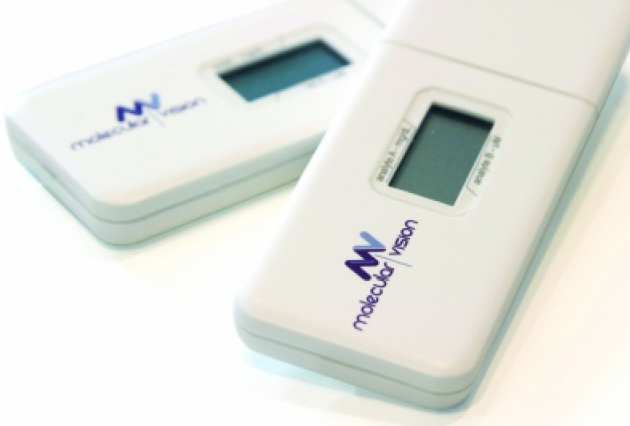Related departments and groups
 Imperial spinout Molecular Vision Ltd has developed a technology platform (known as the BioLED™ platform) that quickly produce lab-quality information from a single sample of bodily fluids. The low-cost, instrument-free, disposable point-of-care device is able to measure previously incompatible parameters on a single test from a single sample, providing both quantitative and qualitative information.
Imperial spinout Molecular Vision Ltd has developed a technology platform (known as the BioLED™ platform) that quickly produce lab-quality information from a single sample of bodily fluids. The low-cost, instrument-free, disposable point-of-care device is able to measure previously incompatible parameters on a single test from a single sample, providing both quantitative and qualitative information.
To date Molecular Vision has:
- validated the platform by multiplexing an albumin and creatinine panel in a urine sample as well as a Myoglobin and CK-MB panel in a serum sample; each panel respectively, on an integrated microfluidic device
- undertaken over £1.5M of contract work for a variety of customers including Acrongenomics Inc, Microfluidic ChipShop and L’Oreal; addressing analysis problems relating to kidney and cardiac health, pathogen identification and cosmetics
- generated a total of over £3.4m in investment, contract revenue and non-UK grant funding
- created greater than 50 man years of UK employment, primarily at the PhD level
Abingdon Health Group acquired a majority stake in MV in 2012 as part of its strategy to create a fully integrated business in the UK that is able to compete in the large and global immunodiagnostics market.
Molecular Vision was founded in 2001 to develop and commercialize instrumented, lab-on-a-chip, microanalysis systems invented at Imperial by Professors Andrew and John de Mello (Chemistry Department) and Donal Bradley (Physics Department). This innovation was informed by long-term research undertaken by Bradley and John de Mello on organic light emitting diodes (OLEDs) and photodiodes (OPDs) and by Andrew de Mello on microfluidic chip structures.
In the news
- Doctor on a Chip - The Engineer
- Product Pipeline: Four Imperial spin-outs are redefining high-resolution imaging - Imperial news
Support us
Help us continue our work by donating to the College and directing your donation to the Faculty of Natural Sciences.